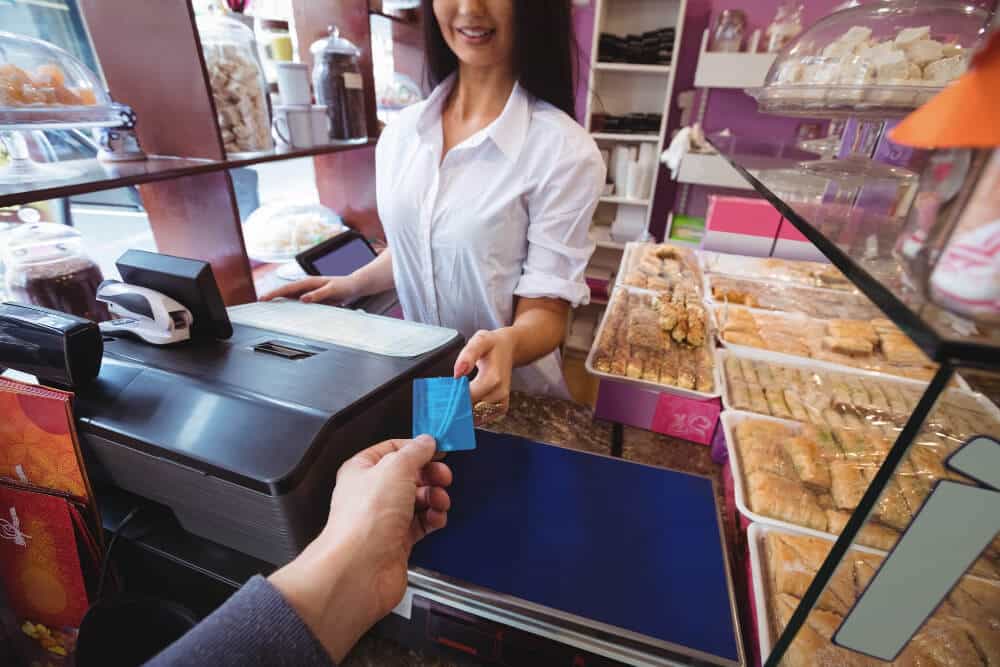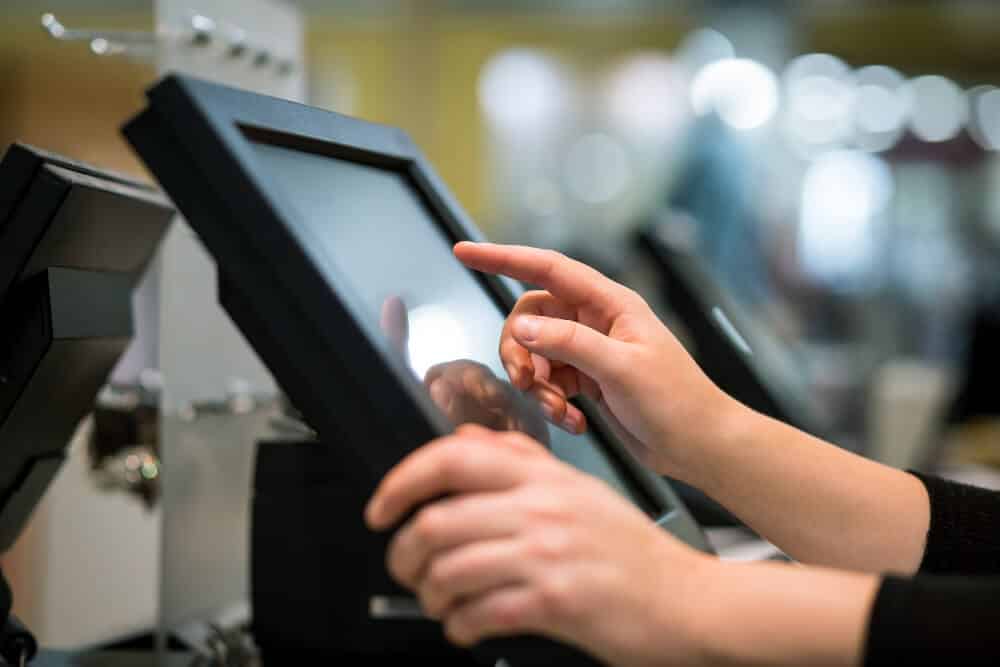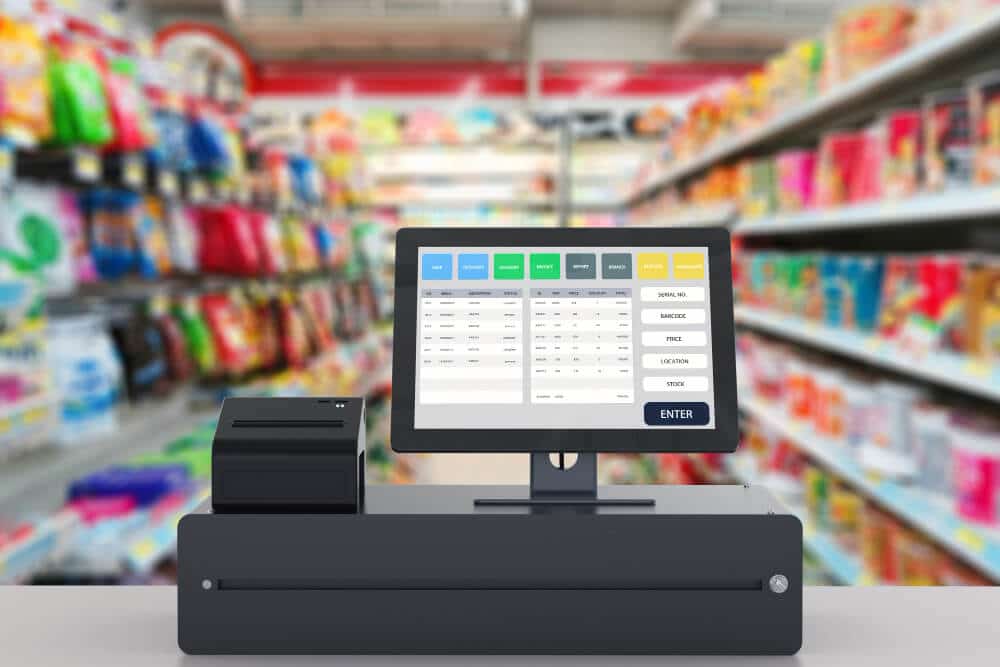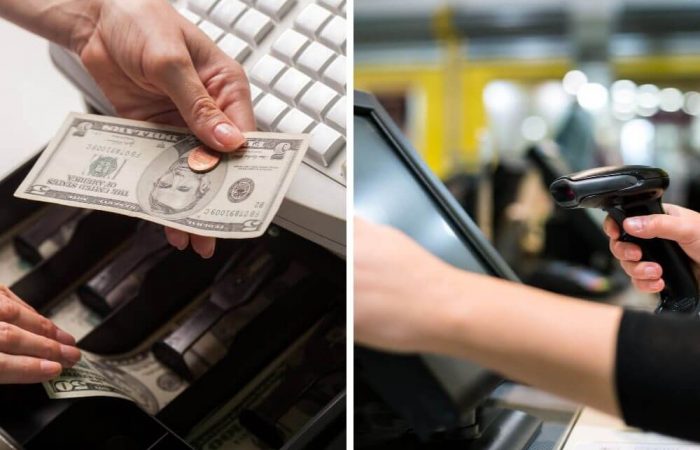A cash register and a point-of-sale (POS) system are both devices used to record sales transactions. However, they serve different purposes and have different features. Both of these devices are mainly used by retail businesses, but POS systems are also used in restaurants and other service-based businesses.
Having a clear understanding of the difference between a cash register and a POS system is important for any business owner who wants to choose the right device for their needs. In this article, we will dig deep into both devices to help you understand the key differences. We will take a look at what they are, how they work, and which one is right for your business.
Table Of Content
What is a cash register?
Features of Cash Registers
What is a POS?
Features of a POS
Cash register vs. POS system
How to decide between a cash register or POS system
What is a cash register?

Cash registers are one of the most commonly used pieces of equipment in retail businesses. They are designed to record sales transactions and store cash. Cash registers are typically used in small businesses, such as convenience stores, coffee shops, and mom-and-pop shops. It’s fairly simple to use and doesn’t require a lot of training.
Cash registers have keypads for entering amounts as well as barcode scanners, cash drawers, receipts printers, and scales. It was created by James Ritty in 1879. As we are in the era of digitalization, many advanced features have been added to cash registers. From touchscreens to inventory management, cash registers have come a long way.
Cash registers are mostly used by businesses that have a low volume of sales and don’t need the more sophisticated features that POS systems offer. Small businesses such as salons, retail shops, and bakeries typically use cash registers.
Features of Cash Registers
Let’s take a look at some of the features that are typically included in cash registers:
1. Simple to use
Cash registers are designed to be easy to use. You don’t need any special training to be able to use one. Cash registers are just input devices with a few other features. It comes with a simple layout, which is fairly simple to understand. You can easily learn how to use a cash register within a day.
2. Keypad and touchscreen options
Cash registers come with either a keypad or a touchscreen. Keypads are the traditional input method for cash registers. You can use them to enter prices, discounts, and other information. Touchscreens are becoming more popular in recent years. They offer a more intuitive way of inputting data. You can simply touch the screen to select items and add them to the sale.
3. Receipt printer
A receipt printer is a common feature in cash registers. It allows you to print out receipts for customers. Receipt printers come in many different types. The most common type is the thermal printer. Thermal printers use heat to print out receipts. They are fast and quiet. Another type of receipt printer is the impact printer. Impact printers use a hammer to print out receipts. They are slower than thermal printers but they are more durable.
4. Cash drawer
A cash drawer is a common feature in cash registers. It is used to store cash and other valuables. Cash drawers come in many different sizes. The size of the cash drawer depends on the number of sales that the business does. Cash drawers typically have a lock to keep them secure.
5. Barcode scanner
A barcode scanner is a type of optical scanner that is used to read barcodes. Barcode scanners are used to scan items so that the price can be automatically added to the sale. Barcode scanners come in many different types. The most common type is the laser scanner. Laser scanners use a laser to read barcodes.
Also Read: Checklist for Opening Your Dream Salon
Pros & Cons of a cash register
Here are some of the pros and cons of a cash register:
Pros:
1. Fast checking out process: Cash registers are designed to be efficient and fast when processing sales transactions. This reduces the amount of time customers have to wait in line and makes for a smoother checkout experience.
2. Accurate accounting: Cash registers can easily keep track of money taken in and out, ensuring accurate accounting of a business’s finances. This makes it easier for businesses to stay organized and manage their resources better.
3. Security: With cash registers, customers can see exactly how much they are paying, which often leads to fewer disputes or problems when handling money. Additionally, cash registers can help deter theft and fraud since they keep track of all the transactions taking place in the store.
4. Accurate reports and analytics: Cash registers are designed to provide accurate reports and analytics on sales, which can help businesses better understand their customers’ needs and improve the shopping experience.
Cons:
1. Expensive upfront cost: Cash registers can be expensive to purchase and maintain, so businesses must consider whether this type of investment makes sense for their needs.
2. Limited functionality: Cash registers are designed to do one task and one task only: process sales transactions. As such, they lack the flexibility that other point-of-sale systems may offer, such as the ability to track customer loyalty or generate detailed inventory reports.
3. Lack of mobility: Cash registers must be tethered to an electrical outlet, which can limit their placement in a store. This can make it difficult for businesses to take advantage of impulse sales or transactions in areas outside of the traditional checkout lanes.
4. Vulnerable to power outages: Due to their reliance on electricity, cash registers are vulnerable to power outages. This can lead to long delays in processing transactions and may even lead to lost sales if customers become frustrated with the wait times.
What is a POS?

POS or Point of Sale system is a computerized replacement for the traditional cash register. A POS system can do everything that a cash register can do and more. POS systems are used in a variety of businesses such as restaurants, bars, retail stores, grocery stores, and gas stations.
The POS system enables businesses to operate more effectively since they can track, analyze, and interpret a larger number of metrics. They also provide you with more in-depth insights that improve your decision-making. Similar to cash registers, POS systems have a variety of features such as barcode scanners, receipt printers, and cash drawers.
However, what sets POS systems apart is that they are much more versatile. For example, most POS systems can integrate with various software applications such as accounting, inventory management, customer relationship management (CRM), and eCommerce platforms. This allows businesses to automate various tasks and processes.
Features of a POS
So now that we know one or two things about POS or Point of Sale systems, let’s take a look at some of the features that are typically included in POS systems:
1. Inventory management
POS systems come with inventory management features. This allows businesses to track their inventory in real time. This is essential for businesses that sell physical goods since it helps them avoid stockouts and overselling. This feature automatically updates the inventory levels when sales are made.
2. Customer management
Customer management means that businesses can track their customers’ buying habits. This is useful for businesses that want to offer loyalty programs or targeted marketing campaigns. POS systems typically come with a CRM (customer relationship management) application. This application helps businesses manage their customer data.
3. Analytics and reporting
Analytics and reporting features help businesses track their sales and performance. POS systems generate reports that show businesses how they are doing. This information is essential for businesses that want to grow and improve their operations. You can make sound decisions based on the data that is generated by the POS system.
4. Employee management
Employees are the backbone of any business. POS systems come with employee management features. This allows businesses to track employee sales, performance, and hours worked. This information is useful for businesses that want to optimize their workforce.
5. App integration
POS systems can be integrated with various software applications. This allows businesses to automate tasks and processes. For example, businesses can integrate their POS system with their accounting software. This allows businesses to automatically generate invoices and track sales data.
6. Customization and compatibility
One of the most useful features of POS systems is that they can be customized to fit the specific needs of a business. POS systems are also compatible with a variety of hardware such as barcode scanners, receipt printers, and cash drawers. And the best part is that POS systems can be used with a variety of devices such as PCs, tablets, and even smartphones.
Also Read: How to Prevent and Avoid Chargebacks
Pros and cons of a POS system
Here are some of the pros and cons of using a POS system:
Pros:
1. User-friendly: POS systems are designed to be intuitive and easy to use, making them great for businesses with staff who have limited technical knowledge.
2. Automation: POS systems automate mundane tasks such as calculating sales tax, ringing up customers, and inventory tracking. This can save time and money which is invaluable for businesses.
3. Data analysis: POS systems can track customer purchases and generate detailed reports that help businesses understand their customers better.
4. Security: POS systems offer an extra layer of security since they require unique PINs or passwords to access them.
5. Employee tracking: POS systems can track employee hours and sales which helps businesses better manage staff and payroll.
6. Fast checkout: POS systems help speed up the checkout process, making customers happy and businesses efficient.
Cons:
1. Set-up time and cost: Setting up a POS system can involve complex procedures that take time and money to complete. There are also subscription fees for many POS systems.
2. Connectivity: Every POS system needs to be connected to the internet to function. This can cause connection problems, especially in areas with poor internet coverage.
3. Compatibility: Some POS systems are not compatible with certain software or operating systems, so businesses have to make sure the system they choose is the right one for their needs.
4. Fewer customizations: Many POS systems have limited customization options, so businesses may not be able to tailor the system to their specific needs.
5. Limited support: Many POS systems offer limited customer support, so if something goes wrong businesses may have to wait for help.

Streamline your business with Octopos– A Complete POS System with Big Boys Tools without the Big Price
It is a lot more than a point of sale. Octopos is easy and intuitive for you and your staff to use. Yet you get all these sophisticated tools to manage inventory, track and engage customers, get meaningful insights into your business, and much more.
Cash register vs. POS system: What are the differences?
By looking at the features you can get an idea of the difference between cash register and pos system. Let’s take a look at some of the fundamental differences between these two:
Purpose:
Both cash registers and POS systems are used to process sales transactions. However, the purpose of a cash register is limited to processing sales transactions. On the other hand, POS systems are designed to provide businesses with a complete solution for managing their operations.
Functionality:
Cash registers are simple devices that can only be used for processing sales transactions. systems, on the other hand, are much more versatile. They come with a variety of features such as inventory management, customer management, employee management, and analytics.
Cost:
Cash registers are typically cheaper than POS systems. This is because they are simple devices with limited functionality. POS systems, on the other hand, are more expensive. This is because they come with a variety of features and applications.
Ease of use:
Cash registers are easy to use since they have a limited number of functions. POS systems, on the other hand, can be more difficult to use as they come with a variety of features and applications.
Customization:
POS systems are known for their flexibility and customization. This means that businesses can tailor the POS system to fit their specific needs. Cash registers, on the other hand, are not as customizable. However, some businesses only need a simple device to process sales transactions and cash registers are perfect for that.
How to decide between a cash register or a POS system
It completely depends on your business and business needs. Here are some factors to consider when deciding between a cash register or POS system:
How many inventories do you have:
If you have a small number of inventories, then a cash register should suffice. However, if you have a large number of inventories, then you might need a POS system to keep track of them.
How many cash registers do you have:
Businesses that are located at multiple locations might need a POS system to manage all of their registers. This is because POS systems come with features such as remote management and a central database.
How many staff do you have:
Cash registers are ideal for small businesses that have one or two staff members. POS systems, on the other hand, are better suited for businesses that have multiple staff members. This is because POS systems come with features that allow them to process payments simultaneously.
Your future goals:
You should also consider your future goals when deciding between a cash register or POS system. If you plan on expanding your business, then you might need a POS system to manage your operations. It might be a good idea to invest in a POS system even if you don’t need all of the features it offers. This is because you can always add more features as your business grows.
Conclusion
So there you have it! In this article, we talked about point of sale vs cash register. Now you should have a better understanding of which one is right for your business. Every business is unique and has unique needs so important to take the time to consider your business needs before making a decision.

